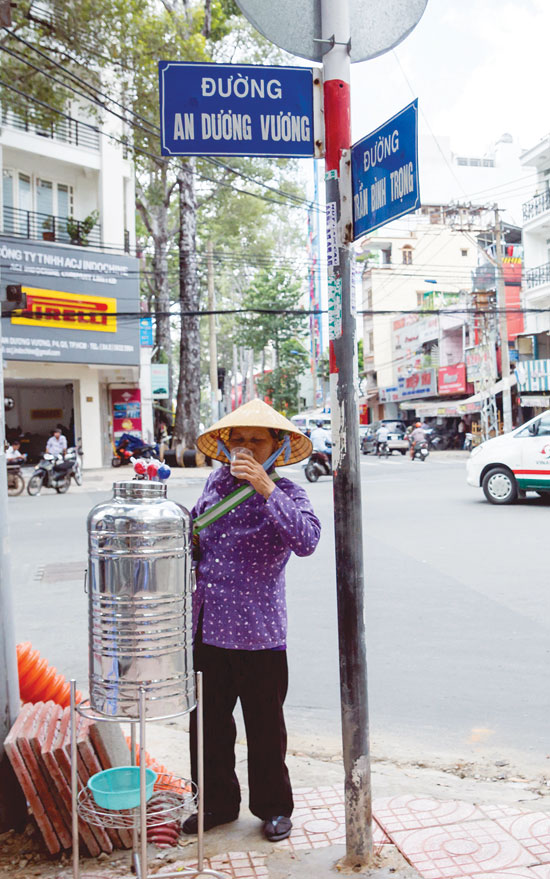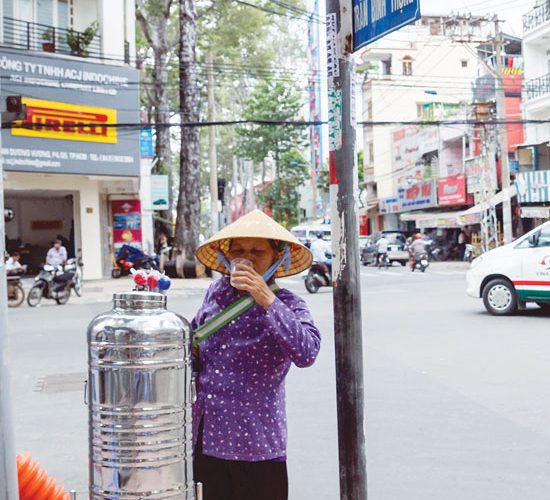No 11, Vol.5, December 2015 – January 2016

A free ice tea can in the street. Photo:Tran Minh Trung
Late in July of this year, Hanoi police confiscated a ‘free iced tea’ can on a street sidewalk, frustrating many people. The week-long storm of reaction that followed reminded me a few things.
About 15 years ago, I came to a province in Mekong Delta and saw on roadsides a big ceramic pot, with a metal tray covering it and a coconut shell dipper on top.
‘That’s free drinking water. We are surrounded by rivers, but drinking water is scarce, so some good people put clean water at their gates for thirsty passersby,’ a local man told me.
An 80-year-old woman said, ‘I have been seeing these pots all my life. Some even built a palm leaf hut and put a bamboo couch in there with the water pot, so tired travellers could relax a little while relieving their thirst.’
I tried a sip and recognized the taste of rain water. ‘Is this water safe to drink, grandma?’ I asked. ‘I don’t know’, she answered. People have been drinking it ever since I can remember, and nobody got sick.’ The old lady’s confidence was simple.
I met Mr Le Dinh Bich, lecturer of Can Tho University and researcher of West-Southern culture. He told me, ‘Over 300 years ago this whole area, including Saigon, was almost uninhabited. Rivers are all around, but clean water was scarce. So, some generous souls put a water jar on roadside for everybody to use. Over time, people realized the humane nature of the act, and followed the example. The empathy jars became more frequently seen. 20 years ago I scoured the region and saw plenty of them on roadsides.’
According to Mr Le Dinh Bich, one can say that putting these water jars in this region and on Saigon streets has become a custom.
Returning to this western region in 2010, I saw a lot fewer roadside jars. A friend from An Giang told me, ‘There are shops everywhere nowadays, so the good people removed their jars.’
I also noticed that where available, the centuries-old jars have been replaced with a plastic cans with a tap and a plastic mug on each. Some even put tea and ice in the can and stick on it a sign reading ‘Free iced tea’ or ‘Free to drink’.
At that same time, I saw more and more free iced tea cans on Saigon streets.
Today, those cans of all sizes and shapes can be seen on the sidewalks of almost all the big streets of Saigon. Each has a few mugs or many single use plastic glasses beside it.
One free iced tea can owner told me, ‘Everyday I spend VND50,000 for the clean water, tea and ice.’
Homeless people, peddlers, lottery ticket sellers and beer bottle-collecting kids often come to drink. Some even take a bottle of water with them after drinking.
‘I bring some water with me every day. But it often runs out midway because my work takes a lot of sweat. Those free tea cans save me from having to spend extra, and I am grateful to the kind folks,’ Ms An, a beer bottle collector said.
‘Even some Western backpackers drink the free iced tea to save money,’ a tea can owner on Vo Van Tan Street smiled.
July last year, I came to Hanoi and saw some free iced tea cans on sidewalks, just like in Saigon. A brother in law of mine, who lived in Hanoi but who spent two years scouring Saigon streets said, ‘Three years ago, Hanoi didn’t have those free iced tea cans. Perhaps some Hanoi folks saw them in Saigon and thought it’s good to follow the example.’
On July 27, 2015 dozens of online newspapers reported that a free iced tea can on a sidewalk of Giai Phong Street of Hanoi was seized by the police of Thinh Liet Commune, Hoang Mai District. The news immediately became the topic of heated discussions on social media and in coffee shops of Saigon.
Taking tiny sips of coffee on Tran Nao Street sidewalk of Saigon, a friend of mine remarked, ‘By law, removing the cans is a right thing to do. But then, they should also remove all other things that obstruct the way, so they are not thoroughly right. And from the charitable point of view, the police were insensitive toward the poor souls that need the drink.’
Some posted on Facebook, ‘Seizing the iced tea cans, the police seize people’s kindness.’
I asked a columnist specializing in social themes, ‘Why does the public opinion, especially in the South, reject so strongly the action of Thinh Liet Commune’s police?’ He explained, ‘Most people love charity, so it’s natural that they are against the police hindering a charitable act.’n

